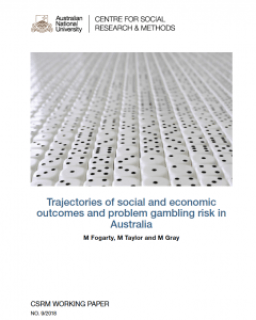
Abstract
Researchers are increasingly recognising the importance of longitudinal data in providing valuable information on individuals to better understand gambling behaviour, trajectories, risks and consequences. However, relatively few longitudinal surveys have a significant focus on gambling. This paper makes use of a longitudinal data source that has, for the first time, included questions on gambling behaviour in Australia: the Household, Income and Labour Dynamics in Australia (HILDA) survey. The HILDA survey included gambling questions for the first time in 2015 (wave 15). Although the HILDA survey currently provides data on gambling at a single point in time, there are data on the individuals back to 2001, in most cases. This paper uses selected social, economic and health variables, and analyses their trajectories over time across the gambling risk categories measured in 2015. The paper explores economic variables (household income, employment, qualifications, financial hardship, risk and stress) and selected social variables (life satisfaction, psychological distress, alcohol intake and smoking) from multiple HILDA waves. The analysis clearly shows that problem gamblers experience significantly worse outcomes than those without gambling problems, and poor outcomes go back a number of years. In a number of cases, outcomes are becoming progressively poorer, which may suggest either increasingly risky gambling behaviour or the cumulative effects of a sustained period of problem gambling. Low- and moderaterisk gamblers have better economic, social and health outcomes than problem gamblers, but, in most cases, worse outcomes than those without gambling-related problems. Again, these differences go back a number of years. Exploring these particular variables in respect of problem gambling risk provides insights that may inform prevention and early intervention strategies to reduce gambling harm.
File attachments
| Attachment | Size |
|---|---|
| CSMR_WP9_2018_GAMBLINGRISK.pdf(636.31 KB) | 636.31 KB |